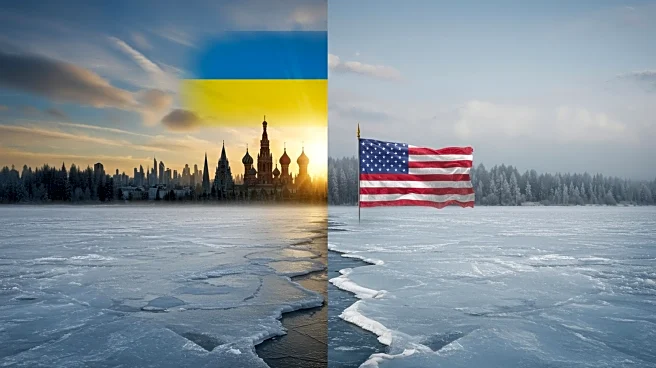What's Happening?
The recent Alaska summit between the United States and Russia concluded without any significant breakthroughs or announcements regarding the ongoing conflict in Ukraine. The meeting, attended by U.S. President Donald Trump and Russian President Vladimir Putin, did not result in a cease-fire agreement, which Ukraine had been hoping for. Despite the lack of concrete outcomes, both leaders appeared content with the discussions. President Trump, who had previously issued an ultimatum to President Putin, relished the opportunity to engage in dialogue with the Russian leader. Meanwhile, President Putin faced no immediate pressure to concede to Ukraine's demands for a cease-fire.
Why It's Important?
The summit's outcome underscores the ongoing complexities in U.S.-Russia relations and the challenges in resolving the conflict in Ukraine. The lack of progress in achieving a cease-fire highlights the geopolitical tensions and differing priorities between the involved nations. For Ukraine, the absence of a cease-fire means continued uncertainty and conflict on its territory. The summit's results may influence future diplomatic strategies and negotiations, as both the U.S. and Russia navigate their international relationships and domestic political landscapes. The situation remains a critical point of interest for global security and stability.
What's Next?
While the summit did not yield immediate results, it sets the stage for potential future negotiations and diplomatic efforts. The international community, including European allies, will likely continue to monitor the situation closely, advocating for peaceful resolutions. The U.S. and Russia may engage in further discussions to address the broader implications of their relationship and the ongoing conflict in Ukraine. Stakeholders, including Ukraine, will need to assess their strategies and alliances as they seek to influence future diplomatic engagements.
Beyond the Headlines
The summit's outcome may have deeper implications for international diplomacy and the balance of power. The interactions between President Trump and President Putin could signal shifts in U.S. foreign policy approaches, particularly regarding Russia. Additionally, the ongoing conflict in Ukraine remains a focal point for discussions on international law, sovereignty, and human rights. The summit's results may also impact domestic politics within the U.S. and Russia, as leaders navigate public opinion and political pressures.









